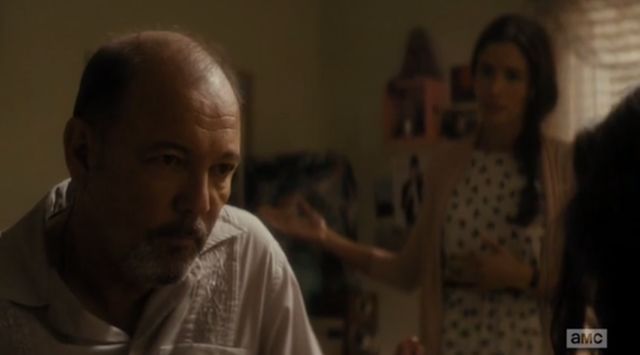Fear the Walking Dead, Season 1, Episode 4, “Not Fade Away”
Written by Kari Skogland
Directed by Meaghan Oppenheimer
Airs Sundays at 9pm (ET) on AMC
The promise of Fear The Walking Dead initially came at least partially from its use of foreshadowing. It told viewers for three weeks that the apocalypse was coming and that if we held tight, we would get the thrill of watching Los Angeles fall. Instead, we get “Not Fade Away.”
This week’s episode focuses exclusively on life inside Maddie’s neighborhood, one that has been contained by an army unit. This unit has built a fence around the area and seems to be providing enough security for its residents to live normal lives (Travis runs! Nick swims!). As the episode progresses, it becomes clear that this unit is also hiding things. Most notably though, this episode skips the nine days in which the camp is set up.
There’s a scene in the second season of The Walking Dead, a flashback in which many of the main characters sit gridlocked on the highway outside Atlanta, a supposed safe-haven. As they look out on the cityscape, the city is bombed. It’s haunting, terrifying, and tells the audience in a single image exactly how far gone this world is. “Not Fade Away” skips this show’s chance at any scene like that.
Instead, it places us in an already deserted Los Angeles, one that has been utterly decimated offscreen. The choice to move this evacuation and destruction away from the show is a problem. It’s as if the show saw a chance for truly horrifying and interesting drama and chose to side-step it. When we watch television, we do it because we want to feel something. Fear The Walking Dead, through its four episode run, has committed the cardinal sin of being fairly watchable, but utterly boring.
There’s one notable exception to this assessment. Daniel Salazar continues to fascinate, mostly because it feels like he knew this was going to happen before it even started. His encounter with Maddie is the episode’s best moment, one that sees a father honestly preparing for what he anticipates will be an incredibly difficult situation. Around him, the rest of the cast seems mostly stunted by writing that asks them to play out a single character trait.
Early on, Travis and Maddie argue about Travis’ inability to help around the house in their kitchen and Alicia tells them to stop acting so domestic. That’s exactly the show’s problem: It has created a safe bubble for its characters, one which eliminates tough decisions and asks the characters to react constantly. Instead of watching them fight for their own survival, we see Nick be forcibly removed from his home for reasons unknown, while every other character is powerless to stop it, eliminating their agency.
The series’ only redemption continues to come from its direction. As frustrating as the opening sequence is from a plotting standpoint, it is impeccably directed. It starts in the water, in a move that is incredibly reminiscent of Breaking Bad’s famous season two openings. Quickly afterwards, though, it establishes a world of fragile stability, one that exists in the middle of completely desolated surroundings.
If only the rest of the show was this ambitious, it could easily surpass its predecessor. Of the two, its premise of a world collapsing is by far the more interesting. It has the potential to be a show that avoids The Walking Dead’s endless cycle of safe-havens that are somehow corrupted. Instead, Fear The Walking Dead could be a program that actually follows an arc, one that sees the world slowly but surely come undone.
It can’t be that show if it refuses to put its characters in even remotely interesting situations. When we see horrible thing after horrible thing happen to these characters, but their actions fail to shape the plot in any meaningful way, it feels as though there must be more interesting characters we could be focusing on instead. It’s true, of course, that Maddie sneaks out of the compound and Liza chooses to go to the facility where patients are supposedly being treated, but these actions are meaningless ones, at least through the first four episodes. The decisions of the show’s central characters feel secondary, and instead the decisions made by characters introduced in this episode (looking at you, Dr. Exner) carry much of the show’s weight.
Don’t give up on Fear The Walking Dead yet, though. It has the ability to turn its first season around and shift the paradigms that have been established in interesting ways. The first step along this path comes from the plot: It’s simply not interesting to watch people get paranoid that their lives seem to be going too well. Should the characters start acting more like Daniel, who at least seems to understand that something should be happening, the series can start moving forward and end the season on firm footing.


